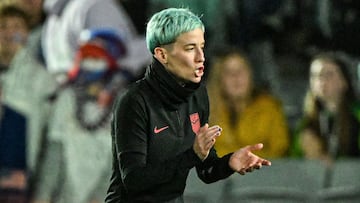What does LFG mean for the USWNT and when did it start?
Roughly four years ago, over 20 players initiated a lawsuit against the U.S. Soccer Federation alleging gender discrimination and requesting equal pay.


In 2019, a 1.2 billion-person audience witnessed the United States Women’s National Team clinch the Women’s World Cup in France. The crowd erupted into an “Equal pay!” chant instead of the customary “USA!”. This was due to the ongoing pay parity dispute associated with U.S. Women’s Soccer. Since then, the legal battle between the United States Soccer Federation and the Women’s National Team has captured global attention.
To fully grasp this lawsuit, it’s essential to understand the events leading up to its filing in 2019. The roots of this dispute can be traced back to 1999 when the U.S. Women’s National Team (USWNT) won their second World Cup and began publicly highlighting the significant pay disparity between themselves and the United States Men’s National Team (USMNT), even though the latter has never won a World Cup (their best finish being third place in 1930). Even before 2019, the USWNT had been vocal about the fact that they had to put in more effort, play more games, and achieve more victories than the USMNT to earn comparable compensation, even when the latter lost, failed to qualify for the World Cup, or didn’t qualify for the Olympics.
LFG - meaning
‘LFG’- the abbreviation for the USWNT’s rally cry “Let’s f*****g go!”- is also the title of a documentary by Andrea Nix Fine and Sean Fine that features current and former USWNT players Jessica McDonald, Kelly O’Hara, Becky Sauerbrunn, Christen Press, Sam Mewis, and Megan Rapinoe, as well as former player and soccer analyst Julie Foudy. All of them are involved in the USWNT lawsuit for equal pay. The documentary chronicles the players’ journey, from deciding to file the lawsuit to the beginning of their legal battle.
🐐🗣️ GOAT speak https://t.co/lh9tfhMP1s
— U.S. Women's National Soccer Team (@USWNT) July 21, 2023
Over time, the phrase ‘LFG’ has evolved beyond a simple pre-game motivational chant. It now represents the struggle that many women work just as hard, if not harder than men, to succeed in their respective fields, but are often overlooked due to existing gender bias. When the USWNT inevitably wins their next major tournament, they should be able to hear the chants of “USA! USA!” without having to listen to “Equal pay! Equal pay!”
The ‘LFG’ should mean that they have earned their success and deserve fair compensation, which should never be a topic of debate. Considering their impressive track record, the women’s team should be paid even more than the men’s.
The lawsuit
Related stories

Andonovski less than third of Berhalter in pay

USWNT target triple triumph
in 2022 the U.S. Soccer and its Women’s Players settled the “Equal Pay” lawsuit. The agreement entails the payment of $24 million to the women, a group of numerous current and former players, including some of the most acclaimed and popular athletes worldwide. Most of the amount constitutes back pay, an implicit acknowledgment that the compensation for the men’s and women’s teams had been unequal for an extended period.
Perhaps more notable is U.S. Soccer’s pledge to equalize pay between the men’s and women’s national teams in all competitions, including the World Cup, in the teams’ following collective bargaining agreements.